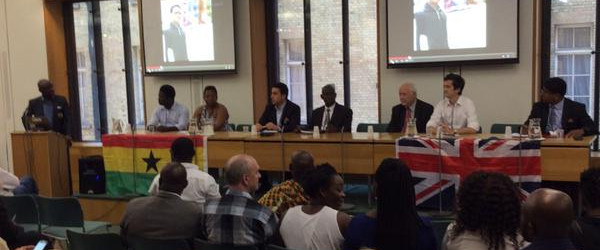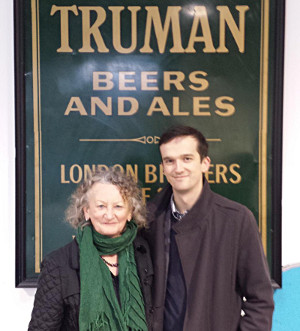Tom Chance: A Green London Mayor should be small business friendly
Tom Chance, one of the Green candidates for London Mayor, on his vision of how a Green Mayor should support small businesses and entrepreneurs. You can find more of Bright Green’s coverage of next year’s London Mayoral and Assembly elections here.
I try to start every Saturday with a trip to my local transition town market – catching up with friends over coffee, and doing a weekly shop. This market is a source of sustainable produce, a social glue for the community, and a nest in which new businesses are nurtured. It represents, I think, much of what the Green Party should be bringing to the whole of London.
We talk a lot about supporting small businesses in general, which keep money circulating in local economies and make shopping parades and office blocks diverse and interesting. I also want to talk about supporting entrepreneurs, and think that should be natural territory for the Green Party.
The rise of the self-employed has been blamed on the lack of jobs vacancies. But research by the RSA suggests that the self-employed precariat may be a bit of a myth – that four in five of the recently self-employed people they surveyed chose to go it alone, rather than out of necessity.
These newly self-employed entrepreneurs were happier even if they were earning relatively little because they were more creative, autonomous and satisfied in their work. Self-employment – and collective employment in small co-operatives – can be about well-being.
Alongside creating jobs in solar power and social housing construction, the Green Party should be supporting more people to run their own companies and co-operatives in London.
Doing so will help us to reach out to BME communities in London. I recently talked to a meeting of Ghanaians living in London who were concerned not just about poverty and discrimination, but more so about developing trade links with Ghana. Many people settle in London and want to start a business – how can we help them prosper here?
My local market helps people start businesses with a clever rent structure: you only pay a percentage of your profits for a pitch. Karen and Laura also put a lot of effort into helping people get a business going. I’ve heard half a dozen entrepreneurs speak passionately about the way this market has changed their lives.
The Mayor should be supporting more spaces like these. Instead of ‘regenerating’ areas with chain stores and expensive commercial units, I would seek to protect low rent units and create more spaces that can incubate new businesses.
The market traders are much like the businesses that were able to start up in the railway arches at Brixton, or the three or four businesses that you find crammed into the back of any money transfer shop or hairdresser in Peckham. These, and many industrial and office companies, are now threatened by land and property speculation – something I’ve explored in pioneering work with Jenny Jones, visiting businesses like the Truman Brewery in Hackney Wick.
We need businesses new and old to be able to sustain themselves. The danger with start-up hubs is that people get trapped, unable to make the leap to a larger space at full market price, and they become an excuse to ignore the plight of established businesses – you redevelop an area, throw in a trendy start-up hub and you’re excused the damage to existing businesses.
I would use planning policy to clamp down on the loss of retail, industrial and office space around London where it threatens to undermine local employment and entrepreneurship.
Finally, I would make high-speed broadband a top priority. Too many small businesses in London are losing out to competition from other cities because the Mayor, government and BT/Virgin are failing to sort this problem out. If they won’t, I’d explore setting up a co-operative service with a wireless ‘mesh’ network, giving every small business that needs it access to higher speeds than they can achieve today.
We can redefine what it means to be business-friendly – not bowing to the selfish demands of big business, but supporting all Londoners who want to run a socially and environmentally responsible business that will enrich their lives and our city.
You can follow Tom’s campaign for London Mayor here:





Certainly small business is preferable to massive corporations – I think all Greens would agree with that – but surely we should be championing new economic solutions, social enterprise, creative cooperative solutions and community projects rather than simply protecting small shopping in the capital of our nation of shopkeepers.
Small business is booming in London, a city filled like no other with market stalls, tiny boutiques, food shops from every cuisine of earth, independent cafes, traditional craft shops, new concept stores and many many more. Yes, we should defend this diverse medley of little businesses, which gives London so much of its vitality, from the ever advancing march of corporate monotony. But given the apparent rude health of the sector, shouldn’t the Green Mayor go further than that? You do mention cooperatives, but shouldn’t they be the main focus of a Green Mayor? Can’t we protect the small businesses the city already has while concentrating on encouraging the addition of radical new enterprises that transform our relationship to each other, trade and our environment through local community action?
I also notice you say “I would use planning policy to clamp down on…”, but do you not believe that decisions like that should be taken by local people in their own communities through participatory planning or at least by having their politicians listen to their own particular needs, wants and views?
Hi Adam,
Some really good comments, thanks.
It’s not really right, first, to say that small businesses in London are all in “rude health”. Yes, there is fantastic diversity and vitality to be found all around the capital, but there are also growing pressures on rents and leases as employment land/buildings are being converted to residential, particular in regeneration areas. Ethnic minority businesses are being disproportionately affected by this phenomenon where “London eats itself” as its population and economy grows. This needs serious thinking and policies, beyond the usual warm words we Greens like to say about small business in general.
Given that there are over 800,000 small businesses in London, I don’t think we should overlook them and just make the lamentably smaller number of coops our main focus.
On how to better support co-ops and other forms of social enterprise, that’s a while other article! Partly we help them through the same policies that help other kinds of smaller business. For example, many co-ops starting in hubs like Hackney Co-operative Developments (http://www.hced.co.uk/) struggle to move out and grow because the leap in rents and the insecure leases is a barrier.
In London the best place for the Mayor to support co-ops in general is with housing. You can set-up a Community Land Trust and it’s there for good, building resilience in the community. With companies, they have to compete to survive, which is much harder.
The really big changes we need are at a national level, legislating in a similar way to countries like Italy and Spain to give co-ops a leg up in a highly competitive capitalist economy. But I’d like to look more at what the Mayor of New York is doing to allocate part of the budget to supporting new co-ops. For example, we could use planning policy and the economic development budget to try and secure more affordable and relatively secure workspaces for co-ops to expand into if they want to grow.
On planning policy, we need both. The Mayor’s strongest powers are with setting Londonwide planning policy and taking over big cases. We need to use that power to prevent the loss of employment capacity, which squeezes small companies the hardest. We can also use the London Plan to recognise and give more power to neighbourhood forums and parish councils – a way to give citizens and local communities more power that’s actually possible without national legislation.